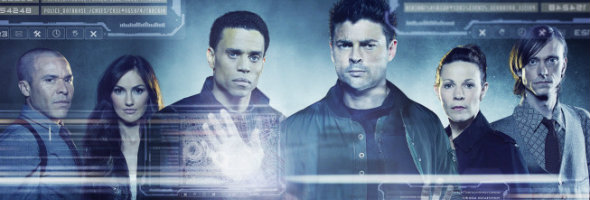ALMOST HUMAN: J.J. Abrams and J.H. Wyman on Finding the Right Balance for Mythology Versus Procedural Elements
September 20, 2013 by Marisa Roffman
When you see the names of former FRINGE showrunner J.H. Wyman and J.J. Abrams (the man behind ALIAS, FRINGE, and LOST…not to mention the director of the recent STAR TREK reboots and the upcoming STAR WARS sequels) associated with the new Fox series, ALMOST HUMAN (a crime-drama set 35 years in the future where human cops are partnered with human-like androids), it’s easy to assume the series will be another FRINGE-like drama that draws heavily on serialized storylines.
But when both men sat down with reporters earlier this week at Abrams’ Bad Robot production offices, they reiterated that this show isn’t quite as similar to FRINGE as you might think.
“I think [FRINGE and ALMOST HUMAN are] incredibly different shows,” Abrams said. “I think the overlap, or the Venn diagram of these two, might be that they’re pushing the edge of technology in that regard, but I think the series themselves are different types of shows. I think what they’re dealing with in this show, it’s much more of a kind of cop show that you might feel is familiar with a huge wrench thrown into that: the huge adjustment being that the cases are not quite what you’ve seen before, and the reasons for, and the truths of, the differences between these two characters are atypical because of the world in which it takes place. And I think the opportunity is to take — some of my favorite shows and movies and books ever have been taking things that are very familiar and throwing something into it that is completely unfamiliar, and then sort of playing that out. And that’s the thing that I love about this show. But it feels very distinct and different from the world of FRINGE, which I think at its core, was a much more serialized show about this dysfunctional father-son, this romance that went over not just years, but different worlds, and I think this is a show that doesn’t quite get into that level of serialized storytelling.”
So what kind of show do the producers see this as?
“To me, this is a show we’re making for an audience that wants to watch a fun police show that has, I think, a lot of drama, comedy, action, and I think some wonderful surprises,” Abrams noted. “But, at the core of the show by default, what interests people that are sci-fi fans — because it takes place in the future, but sci-fi is a bandied about term, it’s just used in ways sometimes that I think is not quite appropriate. In a sense, everything is fiction, it’s on TV, and there’s a lot of stuff that has some science in it, but I wouldn’t say this is in the mold of a ’50s sci-fi romp. I don’t think it feels like that. I don’t think it’s exactly anything else that I’ve seen before. I’ve never been involved with a series, whether it was FELICITY or ALIAS or LOST or certainly FRINGE, every show has been compared to things other people know. So, I’m sure there will be these comparisons being made, but I think it is a show if you are a fan of sci-fi, if you’re a fan of BLADE RUNNER or if you’re a fan of Asimov or Bradbury, you’ll see this and go, this feels like something that is in that universe, but the truth is this show is being made for people who want to go, ‘I want to see a great procedural, I want to see a great crime-drama, I want to see great characters in unique situations.’ And that is the thrust of what we want to do here.”
Of course, that’s not to say there won’t be some elements of mythology to the story.
“I can safely say there is a mythology to the program; there are very important things [going on],” Wyman teased. “What we’re trying to do is get people acclimated to the world and have them go, ‘Huh. That’s weird. Why did that happen?’ And then something else will happen. And then sort of restructure what your perceptions are of what the show is, and make it an interactive experience with the audience, and be like, ‘I thought this was just a cop show.’ In FRINGE, nobody knew in the buses [in season 1’s ‘The Ghost Network’] that the amber was amber. We knew it was amber, but we didn’t know why [it was there and what it really meant]. And ultimately, we put a pin in that and went, ‘Let’s not answer this now, because it’s got to be something great.’ And look what it turned into. And if you look back at the series, it totally recontextualizes that episode. So we’re trying to lay pieces in [on ALMOST HUMAN where] we can make people think, ‘There’s something going on here.’ And it’s not so front and center that you’re watching the drama about that thing right now, it’s just allowing you to realize there’s a larger thing at work here.”
And because there is something larger at work, Wyman shared that he already has a plan for where the series is going to go.
“I understood — after the first week or two weeks, I understood where I wanted to go with the mythology elements of [the show],” Wyman noted. “A lot of people ask about the mythology elements of it [versus procedural]: they’re not mutually exclusive, and that’s what I’m finding out. I’ve said it before, but it took me so long on FRINGE to find out what was the right balance [of the two]. I know you’re probably going, ‘duh,’ but when you’re in [a show], you really don’t see it because you have a whole bunch of masters, and everybody is saying, ‘We want this, we want this, we want this.’ You got to sneak a little Tarkovsky in when they’re kind of looking for the big bangs, and stuff. It took a long time.”
“I think with [the season 2 episode of FRINGE,] ‘White Tulip,’ that was the first time I went, this is how I’m going to tell this story, and this is how I’m going to do it, and this is what it was really about,” Wyman continued. “This was the perfect example, because it had an incredibly emotional story, I think a compelling story for someone who doesn’t really understand this program. Even if somebody watched it for the first time, I think they would go, ‘I truly understand what it is to love somebody that much,’ and so forth. And then you get this guy who is trying to tell his son the truth and he can’t, and it was all about regret. Those organizing themes and principles that you’re used to on FRINGE, they’re there. That’s kind of what it is. But I’m trying to figure out what the marble is [on ALMOST HUMAN]…you’re seeing a lot of things in motion when you’re starting a show, so you get to see what works and what doesn’t…But everybody has been so on about, ‘Is it a procedural?’ like it’s a dirty word. And I totally understand. It is. If you don’t care about characters, then why would you want to watch? I’m with you. But where this is different from FRINGE is FRINGE was a story about a dysfunctional family that was trying to hold it together in a time when it’s really hard to hold families together…but this is different. Because this is legitimately a police show. So if they’re not investigating cases, it would be really weird if a bunch of people in cop uniforms were hanging out at a diner all the time. If it was about their life it would be MELROSE PLACE, I guess. But this is different. There’s a lot of responsibility to the program, because I want to tell stories that reach a large audience. I want them to love the show, too. But I don’t want to alienate my fans and the people who appreciate what I try and do, and put my fingerprint on it. Because I really do believe that’s what those people respond to. My view of the world and how we are in it and my feelings about connection and stories we care about, I want to try and get all that in. But it’s a primetime, big action show that needs to have cases.”
Ah, yes, the cases. Having the series set in 2048 is letting the writers get super creative with the crimes — and the ways criminals will use technology to avoid getting caught.
“You’re going to see murders and go, ‘How did that get committed? How is that solved? Oh my God,'” Wyman shared. “You go to a crime scene, and there’s a thing called a DNA shroud, where it’s like, literally, good luck convicting me, because every time I drop DNA, it shifts and twists. So no court of law can put me in prison. If I don’t have your DNA, and I can’t put you at the scene of a crime, how do you bust a criminal like that? Well, these guys do. And it’s extra hard, and you try and find ways to do it. You’ll see things like drug cases — even on MIAMI VICE, you’ve seen drug cases, but this will be different because the drugs are different. What’s going to happen in 25, 30 years? What are they going to be doing then? What’s metal meth? What does that mean? And how addicting is that? Just the era it’s happening in can stretch the muscles of creativity and imagination, because you’re like, wow, I can solve a case in a way that no other show on TV can.”
“We’ve thought of some [cases] that are really hard to deal with,” Wyman added. “Some things that I was like, ‘I don’t know if we could do that on national television.’ But the truth is, thematically, and what it is — I can’t tell you, because I want it to be an astounding episode — but there’s one I’m thinking of in particular, where it’s like, ‘Oh my God, that’s going to be an issue.’ And then at the end of the episode, you’re like, ‘Oh my God, I didn’t see that coming.’ Because these are ethical issues. I was on the phone with someone from MIT and she’s [working in] robotic ethics. They’re already thinking, ‘How do you treat a robot? Do you work them too hard? What are these beings?’ Just because they’re not human, does that not make them right? We get into this thing where I thought this was the tip of the iceberg and I was right, because there’s so many ways [to explore the issues].”
–
ALMOST HUMAN is set to debut Monday, November 4th at 8 PM on Fox.
Related:
ALMOST HUMAN First Look: Key Art and Photocast
ALMOST HUMAN Co-Showrunner Naren Shankar Exits
ALMOST HUMAN: Michael Ealy on Playing an Android, What Drew Him to the Series, and More
Follow @GiveMeMyRemote and @marisaroffman on Twitter for the latest TV news. Connect with other TV fans on GIVE ME MY REMOTE’s official Facebook page.
And to be the first to see our exclusive videos by subscribing to our YouTube channel at youtube.com/givememyremotetv
Related Posts
Filed under #1 featured, Almost Human
Comments Off on ALMOST HUMAN: J.J. Abrams and J.H. Wyman on Finding the Right Balance for Mythology Versus Procedural Elements




Comments